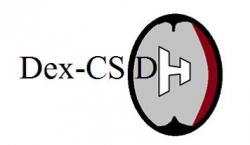
- Surgical + Peri-operative Care
- Trials closed
Dex-CSDH
DEXamethasone in Chronic SubDural Haematoma
Research summary
Chronic subdural haematoma (CSDH) is defined as a predominantly hypodense or isodense collection in the subdural space along the cerebral convexity on computerised tomography (CT). It is especially common in older patients and can happen with only a minor injury to the head even in the absence of trauma. Symptoms that can be attributed to a CSDH include headache, gait disturbance, falls, confusion/cognitive decline, focal neurological deficit, speech disturbance, drowsiness/decreased consciousness and seizures.
In the UK, 5,000 people aged over 65 years are diagnosed with a CSDH each year. In the National Health Service (NHS), patients with severe symptoms usually undergo an operation to evacuate the CSDH. Patients with milder symptoms are usually actively monitored. Although about 80% of the patients tend to recover well from this operation, up to 20% of patients will have a recurrence of the CSDH and require further operation. This significantly reduces the chances of recovery.
Dex-CSDH trial (DEXamethasone in Chronic SubDural Haematoma) is a multi-centre, clinical phase III, randomised, double blind, placebo controlled trial of dexamethasone for up to 2 weeks, on clinical outcome following CSDH. 750 patients with a clinical and radiological diagnosis of CSDH will be recruited from neurosurgical units based within the United Kingdom and Republic of Ireland. The primary outcome measure is the modified Rankin Scale (mRS) at 6 months; secondary outcome measures seek differences in the acute clinical course, mortality, length of stay in hospital, discharge destination and adverse events and complications.
Dexamethasone is a potent synthetic member of the glucocorticoid class of steroid drugs that has anti-inflammatory and immunosuppressant effects. It is 25 times more potent than cortisol in its glucocorticoid effect, while having minimal mineralocorticoid effect. Since its introduction in 1959, dexamethasone has been effectively used in a wide variety of severe and/or serious conditions for which effective treatment had not been available before the introduction of corticosteroids (CTS). If used appropriately alone or with other therapy, the benefit/risk ratio is largely positive.
The trial will therefore have a significant impact on the treatment of patients as the results will determine whether steroids should be prescribed routinely for patients with symptomatic CSDH. If steroids are found to be effective, a significant impact on the speed of recovery and functional outcome of patients is expected. Additionally, this could reduce the incidence of surgical intervention required and the length of hospital stay. As well as the impact on clinical outcome there are health economic considerations that will be addressed by the trial.
We hypothesize that a two-week course of Dexamethasone can improve the 6-month functional outcome of patients with symptomatic CSDH by reducing the rate of CSDHrelated surgical interventions and the recurrence rate. The dose and duration of dexamethasone are reflective of other recent studies in the field. Moreover, a maximum of a two-week course of dexamethasone provides the best balance in terms of clinical efficacy and risks.
Dex-CSDH is a pragmatic, multi-centre, double-blind, phase III randomised, placebo-controlled trial (n=750) assessing the clinical utility of a tapering 2-week course of dexamethasone following Chronic Subdural Haematoma. Stage 1 will take place initially in a limited number of centres in the UK, to ensure feasibility. If successful, stage 2 will follow and will encompass, where possible, all remaining Neurosurgical centres in the UK and the Republic of Ireland.
Stage 1 aims to recruit 100 patients within 12 months. If the progression rules are met, Stage 2 will recruit 650 patients within 2 years. The recruitment rate has been estimated at 2 patients per site per month. On the basis of hospital episode statistics (HES) and data from the ongoing national CSDH audit, approximately 60-80 patients with a CSDH are admitted in a medium-sized neurosurgical unit each year. Hence, the estimated recruitment rate is feasible. Patients will be monitored whilst in the acute Neurosurgical unit and followed up for a period of 6 months post recruitment.
Main inclusion criteria
-
Adult patients aged 18 years or older.
-
Symptomatic CSDH confirmed on cranial imaging (predominantly hypodense or isodense crescentic collection along the cerebral convexity on CT).
-
Patient or Legal Representative is willing and able to provide informed consent or in the absence of a legal representative, an Independent Healthcare Professional provides authorisation for patient enrolment.
Main exclusion criteria
The presence of any of the following will preclude patient inclusion:
-
Patients with conditions where steroids are clearly contra-indicated
-
Patients who are already on steroids.
-
Previous enrolment in this trial for a prior episode
-
Time interval from the time of admission to NSU to first dose of trial medication exceeds 72 hours.
-
CSDH in the presence of a cerebrospinal fluid (CSF) shunt.
-
Severe lactose intolerance or any known hypersensitivity to dexamethasone or any of the IMP (investigational medicinal product) excipients.
-
Patients with a previous history of psychotic disorders
-
Unwillingness to take products containing gelatin
-
Concurrent enrolment in any other trial of an investigational medicinal product
Funders and sponsors
Chief investigator
Prof Peter Hutchinson






